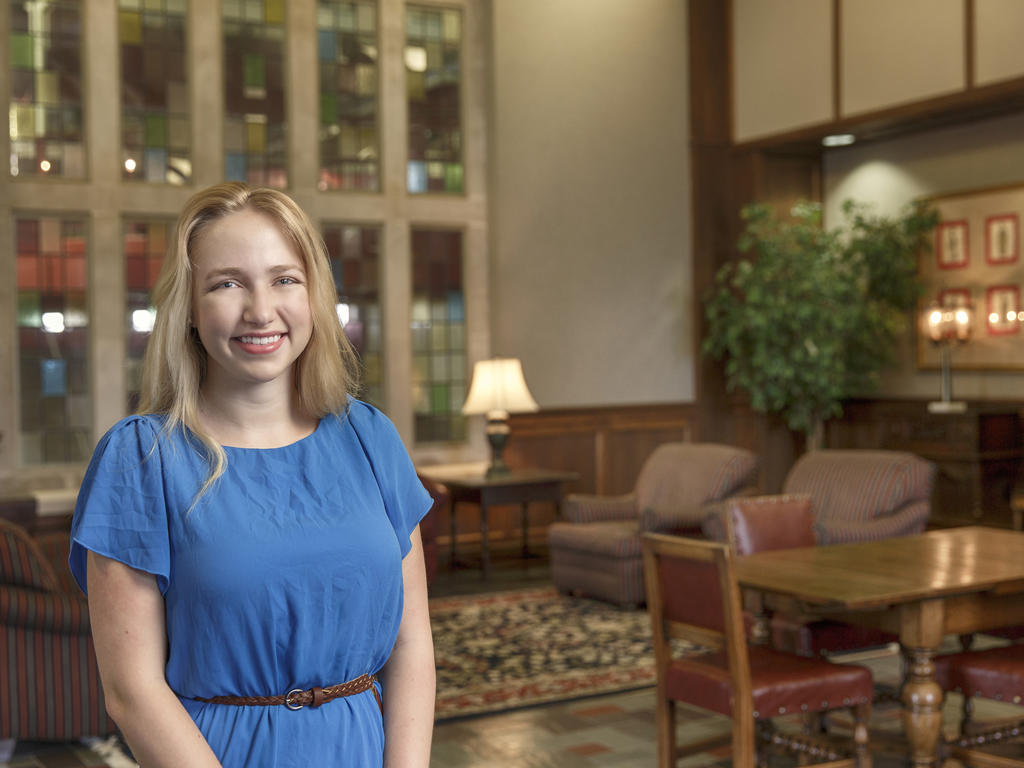Hometown: Fargo, ND (recently moved to Orlando, FL)
Major: History
Academic Interests/Passions: I’m fascinated by the ways in which often-overlooked aspects of popular culture impact political discourse and societal structure. I think that music, literature, art, movies, and other forms of popular culture shape the way we view the world and our place in it and ought to be examined as equally valid conceptions of history.
Extracurricular activities: Alpha Omicron Pi Sorority, Rhodes Student Associate Program, Mentoring local high school students, Phi Alpha Theta, Order of Omega, Rho Lambda, Delta Epsilon Iota Honor Societies, Peer Advocate Center (formerly), Rhodes Activities Board (formerly)
Tell the story of how you got to Rhodes College.
I was instantly drawn to the college when I visited because it was so gorgeous and WARM. Coming from the frozen north, that was a big deal for me. Rhodes faculty and staff also made a huge effort to reach out to me and tell me about Rhodes, something a lot of other schools didn’t seem to do. I felt like if they were making that much of an effort when I was only a potential student, the effort they would make when I was attending would be even greater, and I’m happy to say I was right.
How have you changed since beginning your studies at Rhodes College?
When I first came to Rhodes, I had no idea what I wanted to do. Coming from a fairly rural area of North Dakota to a big city in the South was such a culture shock. Fortunately, I had professors who saw my potential, didn’t give up on me, and took the time to reach out as mentors. I inadvertently stumbled across professors and classes that inspired and shaped me, and if I’d come in with a set path that might not have happened. I’m still not 100 percent sure of what my future entails, but I have a much clearer idea of who I am, my strengths, and my passions.
Tell us a bit more about your participation in the Undergraduate Research and Creative Activity Symposium program. What inspired you to get involved?
URCAS represents everything I love about Rhodes as an intellectual community. The fact that we as undergraduate students are doing such amazing work and are sharing it with each other in a professional way is precisely the benefit of a liberal arts education. I grew up going to conferences with my parents, who are both professors, and I believe the caliber of work presented at URCAS is comparable to work being done on a graduate and even postgraduate level. The size and interdisciplinary focus of Rhodes give us this wonderful opportunity to do independent and truly original work, work that I’m currently submitting to professional journals and conferences across the nation. I see URCAS as a way to give back to the Rhodes community.
You recently presented a paper at the Phi Alpha Theta Regional Conference. Can you tell us a little bit more about your topic and research process? Did you receive any accolades for this work?
I worked on the economic conspiracy theories that emerged in the U.S. and Germany following World War I that blamed the war on the banking industry. It’s a topic that was hugely contentious at the time but has gotten little academic attention since because it was fairly outrageous in its articulation. I really wasn’t interested in disproving or proving the theory; my research was focused more on what these conspiratorial ideas can tell us about the societies they came out of and how they can explain future political developments (especially World War II). I think it’s really important not to dismiss history as irrelevant just because it’s radical or doesn’t fit in with our current ideas of the historical trajectory. Getting second place in the world history category at the conference was just a bonus; what was really great was talking to other scholars about my ideas and getting their feedback.
Will you be doing anything this summer to advance your academic future?
I recently was accepted into the Rhodes Institute for Regional Studies, which will provide me with yet another wonderful opportunity to grow academically. I’m pursuing Honors research in History on the role of country music in defining Southern identity, and this summer I will be doing much of the primary research on that project. I’m so excited to interview local musicians and delve into the all the local archives of music history.
